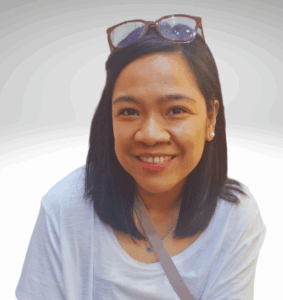Featured scientist: Dr Vivien Visaya
‘My research focuses on the analysis of time series data – data that reflects real-world phenomena observed over time. Beyond traditional statistical modelling and forecasting methods, I am interested in dynamical systems, particularly in how complex systems evolve and exhibit chaotic behaviour. Currently I am exploring Topological Data Analysis (TDA), which employs tools from algebraic topology and geometry to extract shape-based features from data, providing additional insights beyond classical analysis techniques.’
This is the research world of Dr Vivien Visaya, senior lecturer in the Department of Mathematics and Applied Mathematics at the University of Johannesburg (UJ), and UJ Node leader for both NITheCS and CoE-MASS.
Dr Visaya explains that working on dynamical systems means ‘quantifying chaos and understanding how systems change over time – applications range from finance to healthcare and biology.’ TDA, she adds, enhances data analysis by capturing the intrinsic shape and structure of complex datasets.
Her team has applied TDA in finance, medical imaging (including breast cancer and lung scans), disease modelling (TB-HIV co-infection), protein classification, and human genetic admixture analysis. She is also actively involved in mathematics education research and works with international collaborators to develop concept inventories that improve teaching and learning in mathematics.
While the study of dynamical systems is well established globally, Dr Visaya notes that in South Africa, expertise in TDA is still emerging. ‘Workshops and collaborative projects with institutions such as AIMS, UKZN, UWC, WITS and UJ are building a vibrant TDA community, creating advanced research opportunities for Honours, Masters and PhD students. International collaborations are also expanding.’
From Manila to Johannesburg
Born and raised in Manila, Philippines, Dr Visaya completed her undergraduate and Master’s studies while lecturing as a mathematics instructor. She then pursued her Doctor of Science (DSc) at Kyoto University, Japan, supported by a Monbukagakusho scholarship. After earning her DSc, she served as assistant professor at Ateneo de Manila University and the University of the Philippines-Diliman before moving to South Africa as a Claude Leon Postdoctoral Fellow.
Her interest in time series analysis and dynamical systems was strengthened during her postgraduate studies in Kyoto. ‘Exposure to renowned mathematicians, including Fields medalists and authors of foundational texts, challenged and inspired me to pursue rigorous research. My early journey was shaped by opportunities to attend international conferences, workshops and seminars, which broadened both my academic outlook and cultural perspective. In those years, I explored topics such as topological entropy, chaos theory, and the visualisation of high-dimensional binary data.’
She reflects: ‘As a woman in mathematics from a developing country, I regard those early opportunities as initial advantages rather than privileges. Perseverance and access to global networks were essential in shaping my career.’
Collaboration and NITheCS
Collaboration, Dr Visaya emphasises, is key to scientific progress. ‘Working with experts across fields allows us to share techniques, gain new perspectives and adapt to rapidly evolving technologies. For example, collaborations with mathematical biologists and colleagues in machine learning and finance have deepened my understanding of how TDA can be applied in diverse contexts – and how abstract mathematical structures can be meaningfully interpreted in real-world data. These partnerships have been crucial to my growth as a supervisor, academic and researcher.’
She also stresses the importance of institutions like NITheCS in fostering collaboration, disseminating knowledge, and strengthening the scientific community. ‘As UJ Node leader for both NITheCS and CoE-MASS, I see opportunities to expand research capacity by involving UJ academics. NITheCS also promotes STEM education, especially for women and young scholars. For example, as UJ mentee coordinator for STEM MentHER, I help build a community of women in STEM by pairing female Grade 12 learners with female academics or industry professionals as mentors.’
Finally, Dr Visaya encourages young people to seize every opportunity. ‘Attend conferences, workshops and seminars – locally or internationally. Even activities outside your immediate field can broaden perspectives and spark curiosity. Be inspired and stay motivated.’ She recalls how her own academic journey was shaped by participating in programmes like those of CIMPA (in Vietnam and Tunisia), the Santa Fe Institute in New Mexico, and the Institute of Mathematics and Its Applications in Minnesota.

